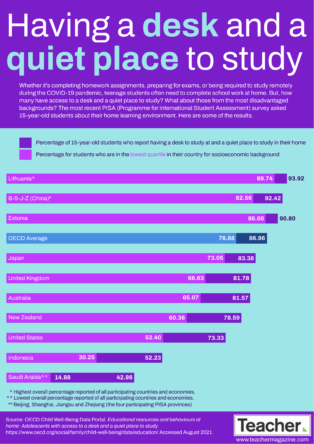End of year exams and assessments, particularly for senior school students, can be a time of heightened stress for many.
In this Q&A, we speak to Linda Williams – Senior Psychologist and the Clinical Lead at youth mental health service ReachOut – about new survey findings on students’ exam stress, and how teachers can continue to help them through this difficult period while they’re on study leave; from setting up a welcoming study space in your classroom to clear boundaries and expectations.
We’re in the run up to final exams for senior secondary students across Australia. ReachOut recently surveyed students about their experiences of stress – what were the main findings?
In August this year, ReachOut surveyed over 1,000 young people in Australia aged 16-25 to gain a deeper understanding of their experience of stress in the lead up to final exams and assessments. The research found that 88% of students had felt stressed about study at some time over the previous 12 months. The research also found that study stress was having an impact on these students' motivation (61%), mood (56%) and sleeping habits (51%). The key concern for young people experiencing study stress was not being able to live the life they had planned (46%). This was closely followed by worrying about how they will compare with other students (43%).
So, we know that study- and exam-related stress is something that will be very real for lots of young people out there. Teachers have a crucial role to play in supporting students through this period. What can they do to help?
Just because students won’t be returning to class after the school holiday break, doesn’t mean you can’t continue supporting them in the lead up to exams. Using online platforms such as Google classroom can help you to stay connected to your students, share resources, post study checklists and offer academic support. If possible, consider opening your classroom up for students that need a quiet space to study. You can drop in and out throughout the day to answer any questions they might have. In addition to academic support, consider sharing mental health and wellbeing resources with your students. ReachOut offers a variety of online resources and tools aligned with the Australian Curriculum. These resources cover topics such as dealing with exam stress and managing disappointing results. If you do spot a student going through a particularly tough time in the lead up to exams, encourage them to access additional support. You could connect them with the school counsellor or wellbeing team.
Related Teacher content: PISA data show just over 80% of 15-year-olds in Australia report having a desk and quiet place to study at home, and this drops to 65% for students who are in the lowest quartile for socioeconomic background.
Parents and carers are also an important part of the process, what can teachers do to support families during this period?
Connecting with parents during this period can be incredibly beneficial. Positive parental engagement can support student learning and improve academic achievement, wellbeing and productivity. Consider making yourself available for parents and carers that have questions and concerns. One way to do this is to organise drop-in sessions for parents after school. Alternatively, for those parents that can’t make it, you could set aside some time each week for phone calls. You can also share academic and wellbeing resources with parents via email to help them support their teen during this time. The ReachOut parents website is a great resource for parents and carers looking for information and tools to help their teen manage their mental health and wellbeing in the lead up to exams.
For lots of students now, they’ll be studying for their finals away from school, but checking in regularly with teachers. What kinds of helpful boundaries should teachers be setting? For example, students may be emailing teachers into the night and getting stressed when they don’t respond.
It’s important that you set clear boundaries and communicate them with your students. Be transparent with students on the level of support you can provide to help manage their expectations. Students might experience heightened levels of stress from the uncertainty around when you will respond. Send an email to all your students being clear about when they can expect a response from you to help alleviate stress.
Students will also be getting in touch asking for feedback – maybe on practice tests, for example. Giving constructive feedback is something teachers can do, but how can they find that balance between also making sure it’s not going to demoralise students?
One of the best ways you can support and prepare your students is by providing them with clear and structured feedback. The delivery of the feedback is key to ensuring that students adopt a growth rather than a fixed mindset. A student with a fixed mindset lets failure or success define them. After a disappointing result in a practice test, the fear of failure in future tasks, activities, or exams can take hold. Always give your students feedback in a safe environment. If possible, make time for a one-on-one conversation in a space and manner that makes them feel comfortable. It’s also a good idea to allow your students time for self-reflection. Ask them to consider the feedback they have been given, and to reflect on what the next steps might be to help them to improve their results. Putting a plan in place to help your student address the feedback they’ve been given can actually help to motivate them.
We’ve talked about students and families – the other person in that equation is the teachers themselves. They’ll certainly be feeling the pressure at this point, and they’re heavily invested in wanting the students to succeed. What tips do you have for teachers in coping with this stressful period?
The exam period is stressful for everyone involved, including teachers. You can’t pour from an empty cup so it’s important to schedule in time for self-care. Remember that it’s okay to set boundaries, and doing so will help you to improve and maintain your personal wellbeing. If you’re feeling overwhelmed, know that you are not alone. Have a chat with a trusted colleague, GP or local health service. Alternatively, if your school has an employee assistance program (EAP) make use of the support on offer.
What strategies do you employ to help reduce exam stress in your students?
How many of your students have a desk and quiet place at home to study? Have you made a quiet study space in school available during exam study periods?
If students are contacting you with questions or seeking feedback, have you been clear about when they can expect a response?



